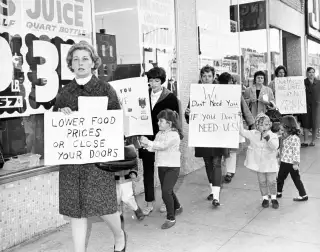The Forgotten Protest Movement of the 1960s

The ‘60s may be remembered as a decade of protest—the Civil Rights movement, the backlash against the war in Vietnam, the Stonewall rebellion, to name just three. But a nearly forgotten cause also made headlines 50 years ago this month, the so-called "housewives’ revolt" of 1966.
An unlikely pairing of words if there ever was one, the housewives’ revolt brought hundreds of placard-toting women into the streets, while many thousands more participated in other ways.
The target of their ire? High supermarket prices.
The first rumblings of revolt were heard in Phoenix, where homemakers angered by bread prices decided to boycott commercial bakeries and start baking their own.
But it was in Denver that the conflict would escalate into all-out war.
One day, Mrs. Paul West (as newspapers commonly identified women in that era) noticed the price for a jar of olives had gone up four times within a single month. When the “feisty, 52-year-old Denver grandmother” asked a store official for an explanation, Life magazine reported, she was told to “stick to your cooking and let us decide prices.”
Wrong answer.
Soon West had organized boycotts of five Denver-area supermarket chains, totaling some 150 stores. By the time the protests were through, stores had dropped their prices by as much as 20%.
The Associated Press found a more modest, but still substantial decline, especially given that prices had been headed nowhere but up before the protests. It reported that a 28-ounce can of baked beans, formerly 49 cents, was now selling for 45. A quart of mayonnaise had dropped from 59 cents to 53, a 32-ounce package of pancake mix from 57 cents to 52.
Asked by Life if she was concerned that prices would shoot back up once the pressure was off, West replied that, “We’ve got scouts and the minute that happens, look out!”
Meanwhile the movement had expanded to other cities across the U.S. and Canada.
“Mad Housewives Spread Boycott” read the headline in the Lowell, Mass., Sun.
In Dallas, women organized what they called a “ladycott” of local supermarkets.
In Buffalo, a group calling itself Women on the Warpath began a boycott of eggs.
The We’ve Had It Club in suburban Atlanta formed a motorcade, taking its protests from store to store.
In Lexington, Ky., boycotters singled out stores that offered trading stamps and other promotional gimmicks, which they said needlessly added to grocery costs.
In Carlsbad, N.M., women picketing one supermarket found themselves being picketed by union members who’d been laid off as a result of their boycott.
Some retailers appeared sympathetic to the women’s complaints, often insisting they had less control over prices than people thought and were simply passing along increases from lower in the food chain.
Others, almost always quoted anonymously, couldn’t conceal their condescension:
“The housewives are emotional,” one grocery exec groused. “The logic of our balance sheet does not interest them.”
“A lot of these women don’t care about facts,” another complained, “they just want the price of bacon to come down.”
An industry executive in Detroit said the women should go picket the White House instead.
READ NEXT: 29 Ways to Save Hundreds on Groceries
In fact, the movement had not gone unnoticed at the White House. Esther Peterson, President Lyndon Johnson’s special assistant for consumer affairs, was dispatched to Denver, where she hugged West and expressed support for the cause.
Not everyone was so optimistic, however. The popular financial columnist Sylvia Porter, normally a champion of consumer causes, argued that “Such slogans as ‘Down With High Prices’ are simply too vague to have significant impact.” Porter predicted that “today’s housewives’ hullaballoo will end up little more than a whisper.”
Indeed, “By the end of November much of the steam seemed to have gone out of the crusade,” the Associated Press would later conclude. “A nationwide boycott set for the weekend before Thanksgiving fizzled. Prices were somewhat lower, but no one could say whether it was just supply and demand, a result of the housewives’ revolt, or, more likely, a combination of both.”
But that may be underestimating the movement’s lasting legacy. Thousands of American women who’d never been involved in a protest before—many of whom said they’d had to ask their husbands’ permission to participate in the supermarket boycotts—now had experience on the front lines. The rest of the ’60s and ‘70s would provide ample opportunity to put those skills to use.